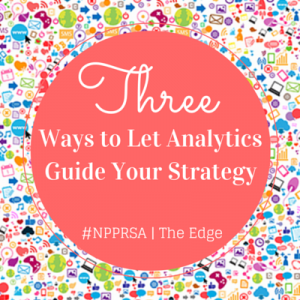 Every PR pro knows a good online strategy is nothing without great content to back it up. Social media should not be overlooked when it comes to strategic planning. As more and more organizations incorporate social media into their overall PR strategy, it becomes increasingly important to create content that sets them apart from competitors and builds trust with audiences. There are so many great tools available (for free!) that can help guide social content to maximize its benefit.
Every PR pro knows a good online strategy is nothing without great content to back it up. Social media should not be overlooked when it comes to strategic planning. As more and more organizations incorporate social media into their overall PR strategy, it becomes increasingly important to create content that sets them apart from competitors and builds trust with audiences. There are so many great tools available (for free!) that can help guide social content to maximize its benefit.
Here are a few ways to use them:
1. Find the Right Time to Post. Timing is everything. The great thing about social media is its instantaneous nature, so messages can get out to audiences in seconds. But is it really necessary and/or beneficial to deliver every message in real-time? Social media users can be connected to hundreds of other users or organizations, and every post is competing for attention. Most PR pros work typical 9-5 hours, so it might seem like it makes sense to post a link to a new blog on Facebook during your work day. But if those who follow a brand on Facebook aren’t online during that time, the post becomes buried among a hundred others.
Tools like Facebook Insights allow organizations to see the demographics of their Facebook followers. One of the most valuable pieces of information is a daily timeline that shows follower activity peaks. Insights is completely free to business/organization pages on Facebook, and it can help pinpoint the best time to schedule posts. It may turn out that time is at 7:00 p.m. on a Friday evening. There are plenty of tools available to schedule posts automatically so the prime posting window isn’t missed because it is outside of traditional work hours.
2. Figure Out What Content Works. It can be easy for a social media strategy to place too much focus on building an audience. Social media is a tool to engage in conversations with an audience. If the audience isn’t responding, something isn’t working. A large fan base does not equal a successful social media strategy.
“While the number of page likes or Twitter followers seems like an obvious metric to track, it is important to measure reach and engagement as well,” said Katie Hinerman, Freelance Digital Marketing Specialist.
Twitter Analytics is a new tool available for organizations to measure the engagement of their Twitter content. The dashboard shows overall impressions (how many times a tweet was viewed), engagement (how many users interacted with a tweet) and engagement rate (ratio of tweets to interactions). A good social media strategy should include a plan for increasing engagement rate across all social platforms.
“Social media marketing as we know it is changing,” added Hinerman. “In 2015, brands are going to have a harder time reaching users organically. This is why it will be especially important to track reach and engagement metrics when measuring your efforts.”
3. Measure Your Success. A strategy can’t be created without goals, and goals can’t be deemed successful unless they’re measurable (Click to tweet!). A social media strategy is no different than any other part of an organizations’ overall communications plan. Once SMART goals are set, they should be measured and tracked for progress. Lack of progress toward a goal could mean efforts need adjusted.
Google Analytics includes statistics on web traffic referrals from social media accounts. If increased web traffic is part of a social media goal, this tool is the best way to measure progress. The results are offered in real-time, and a variety of time frames can be analyzed and compared. Google Analytics is free to use and offers several tutorial videos to coach beginners through the analytics process.
In a world where PR pros are already stretched thin and wearing many hats, strategizing and measuring social media efforts can keep everyone on the right track. Using analytics to guide social media strategy is a great way to make sure that too much or too little work isn’t being done. Knowing what content is most engaging and when audiences are looking for it maximizes the impact with audiences and minimizes the drain on staff. And that keeps everyone happy.
 Jennifer Materkoski is a graduate of Kent State University with a Master of Arts in Journalism and Mass Communications with a specialization in Public Relations. She has worked as a writer and editor for both newspaper and television and as a member of a non-profit marketing and development team. Materkoski is the owner and principal consultant of a boutique public relations firm, Songbird Public Relations. She is an avid sports fan and a yogi. Materkoski resides in Wheeling, West Virginia with her husband and son. Find her on LinkedIn or follow her on Twitter @MrsMaterkoski. She can be reached via email at jen@songbirdpublicrelations.com.
Jennifer Materkoski is a graduate of Kent State University with a Master of Arts in Journalism and Mass Communications with a specialization in Public Relations. She has worked as a writer and editor for both newspaper and television and as a member of a non-profit marketing and development team. Materkoski is the owner and principal consultant of a boutique public relations firm, Songbird Public Relations. She is an avid sports fan and a yogi. Materkoski resides in Wheeling, West Virginia with her husband and son. Find her on LinkedIn or follow her on Twitter @MrsMaterkoski. She can be reached via email at jen@songbirdpublicrelations.com.
